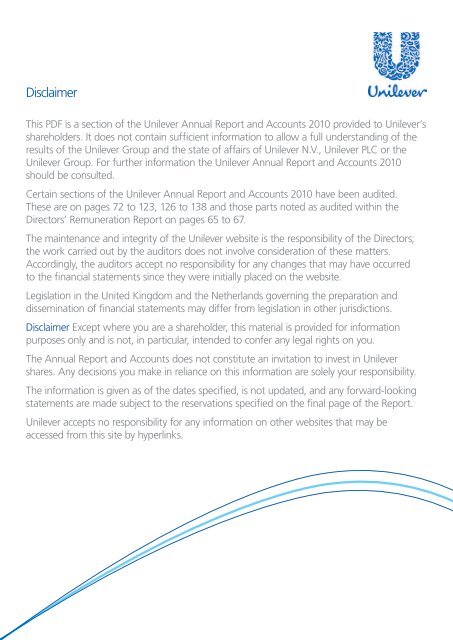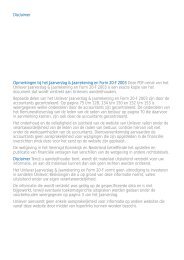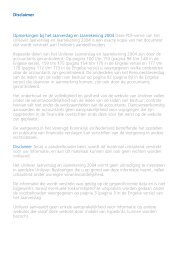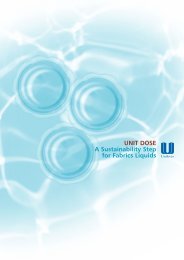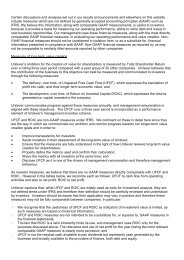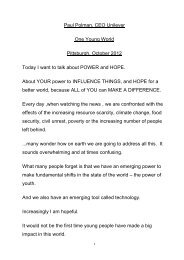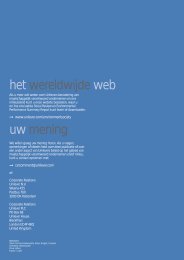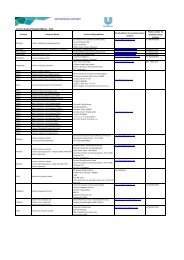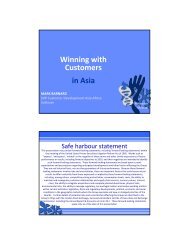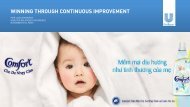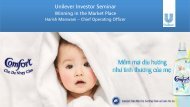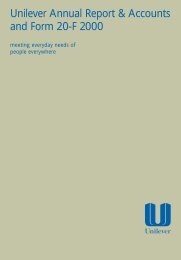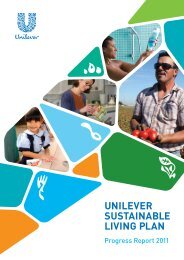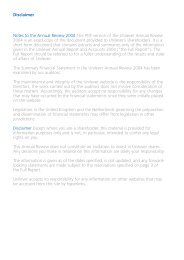You also want an ePaper? Increase the reach of your titles
YUMPU automatically turns print PDFs into web optimized ePapers that Google loves.
Disclaimer<br />
This PDF is a section of the <strong>Unilever</strong> Annual Report and Accounts 2010 provided to <strong>Unilever</strong>’s<br />
shareholders. It does not contain sufficient information to allow a full understanding of the<br />
results of the <strong>Unilever</strong> Group and the state of affairs of <strong>Unilever</strong> N.V., <strong>Unilever</strong> PLC or the<br />
<strong>Unilever</strong> Group. For further information the <strong>Unilever</strong> Annual Report and Accounts 2010<br />
should be consulted.<br />
Certain sections of the <strong>Unilever</strong> Annual Report and Accounts 2010 have been audited.<br />
These are on pages 72 to 123, 126 to 138 and those parts noted as audited within the<br />
Directors’ Remuneration Report on pages 65 to 67.<br />
The maintenance and integrity of the <strong>Unilever</strong> website is the responsibility of the Directors;<br />
the work carried out by the auditors does not involve consideration of these matters.<br />
Accordingly, the auditors accept no responsibility for any changes that may have occurred<br />
to the financial statements since they were initially placed on the website.<br />
Legislation in the United Kingdom and the Netherlands governing the preparation and<br />
dissemination of financial statements may differ from legislation in other jurisdictions.<br />
Disclaimer Except where you are a shareholder, this material is provided for information<br />
purposes only and is not, in particular, intended to confer any legal rights on you.<br />
The Annual Report and Accounts does not constitute an invitation to invest in <strong>Unilever</strong><br />
shares. Any decisions you make in reliance on this information are solely your responsibility.<br />
The information is given as of the dates specified, is not updated, and any forward-looking<br />
statements are made subject to the reservations specified on the final page of the Report.<br />
<strong>Unilever</strong> accepts no responsibility for any information on other websites that may be<br />
accessed from this site by hyperlinks.
Welcome to our<br />
Annual Report<br />
and Accounts 2010<br />
Report of the Directors<br />
About <strong>Unilever</strong><br />
1 <strong>Our</strong> brands<br />
2 Operational highlights<br />
4 Chairman's statement<br />
6 Chief Executive Officer's review<br />
8 <strong>Our</strong> footprint<br />
10 <strong>Our</strong> ambition<br />
12 Winning with brands and innovation<br />
14 Winning in the market place<br />
16 Winning through continuous improvement<br />
18 Winning with people<br />
20 Sustainable Living Plan<br />
22 Financial review 2010<br />
33 Outlook and risks<br />
Governance<br />
40 Biographies<br />
41 Corporate governance<br />
56 Report of the Audit Committee<br />
58 Report of the Corporate<br />
Responsibility and<br />
Reputation Committee<br />
60 Report of the Nomination<br />
Committee<br />
61 Directors’ Remuneration<br />
Report<br />
Financial statements<br />
69 Statement of Directors’<br />
responsibilities<br />
70 Auditors’ reports<br />
72 Consolidated income statement<br />
73 Consolidated statement<br />
of comprehensive income<br />
73 Consolidated statement of changes<br />
in equity<br />
74 Consolidated balance sheet<br />
75 Consolidated cash flow statement<br />
76 Notes to the consolidated<br />
financial statements<br />
124 Financial record<br />
126 Principal group companies and<br />
non-current investments<br />
128 Company accounts<br />
Shareholder information<br />
139 Share capital<br />
140 Analysis of shareholding<br />
141 Financial calendar<br />
141 Contact details<br />
142 Website<br />
142 Share registration<br />
142 Publications<br />
144 Index<br />
<strong>Our</strong> mission<br />
We work to create a better future every day.<br />
We help people feel good, look good and get<br />
more out of life with brands and services that are<br />
good for them and good for others.<br />
We will inspire people to take small, everyday<br />
actions that can add up to a big difference<br />
for the world.<br />
We will develop new ways of doing business<br />
with the aim of doubling the size of our company<br />
while reducing our environmental impact.
Report of the Directors About <strong>Unilever</strong><br />
<strong>Our</strong> footprint<br />
<strong>Unilever</strong>’s products are sold in over 180 countries and used<br />
by 2 billion consumers every day. <strong>Our</strong> impressive presence<br />
in emerging markets, together with a brand portfolio that is<br />
becoming progressively stronger, tells us that we have the right<br />
footprint for growth.<br />
We compete in 11 categories and have<br />
global leadership in seven. More than<br />
75% of our business is in a leadership<br />
or number two position.<br />
We are continually strengthening our<br />
portfolio. We do this by expanding<br />
existing categories into new geographies<br />
or by making ‘bolt on’ acquisitions that<br />
help to build our presence, either in<br />
more countries or at a wider range<br />
of price points.<br />
With more than half our business in<br />
fast-growing emerging markets we are well<br />
positioned for future growth. Asia Africa<br />
CEE is now our largest region and the<br />
fastest growing. We are also experiencing<br />
good growth in Latin America.<br />
In many of these markets we have a reach<br />
and scale that are a source of significant<br />
competitive advantage. Whether it be<br />
favelas in Brazil or villages in rural India,<br />
our depth of distribution is impressive.<br />
In developed markets, our supply chain<br />
ensures we give high quality service<br />
to our modern trade customers in places<br />
like the US and Western Europe.<br />
<strong>Our</strong> markets<br />
Share of revenue from<br />
5eme 3rging markets<br />
%<br />
and growing<br />
Accelerate emerging markets<br />
<strong>Our</strong> growth is increasingly led by emerging<br />
markets. We already have just over half our<br />
turnover in these markets, and with their<br />
strong economic momentum we expect them<br />
to become even more significant over time.<br />
8 <strong>Unilever</strong> Annual Report and Accounts 2010<br />
<strong>Our</strong> regions<br />
The Americas<br />
Underlying volume growth<br />
4.8%<br />
Turnover<br />
€14.6bn<br />
All numbers are at 31 December 2010.<br />
Market value growth<br />
Western Europe<br />
Underlying volume growth<br />
1.4%<br />
Turnover<br />
€12.0bn<br />
Asia Africa CEE<br />
Underlying volume growth<br />
10.2%<br />
Turnover<br />
€17.7bn<br />
<strong>Our</strong> strong performance in 2010 came in the context of a continuing tough<br />
economic environment.<br />
• Western Europe and North America remained soft, with markets flat<br />
at best. We do not anticipate significant improvements in the near future.<br />
• Emerging markets were in a much healthier state, particularly in the early<br />
part of 2010. Although the latter part of the year saw a modest slowdown<br />
the momentum remains strong and we expect this to continue through 2011.
Great portfolio, and strengthening<br />
<strong>Our</strong> categories<br />
Savoury,<br />
Dressings and<br />
Spreads<br />
Underlying<br />
volume growth<br />
2.5%<br />
Turnover<br />
€14.2bn<br />
Ice Cream and<br />
Beverages<br />
Underlying<br />
volume growth<br />
5.9%<br />
Turnover<br />
€8.6bn<br />
Personal Care<br />
Underlying<br />
volume growth<br />
7.9%<br />
Turnover<br />
€13.8bn<br />
Home Care<br />
Underlying<br />
volume growth<br />
8.2%<br />
Turnover<br />
€7.7bn<br />
• Global leadership in Savoury,<br />
Dressings and Spreads.<br />
• Key brands include Knorr,<br />
Becel/Flora, Hellmann’s<br />
and Rama/Blue Band.<br />
• 35% of turnover in<br />
emerging markets.<br />
• Global leadership in ice cream<br />
and tea.<br />
• Key brands include the<br />
Heartbrand and Ben & Jerry’s<br />
in ice cream, and Lipton<br />
and Brooke Bond in tea.<br />
• 45% of turnover in<br />
emerging markets.<br />
• Global leadership in<br />
deodorants and mass skin,<br />
world number two in daily<br />
hair care, significant local<br />
strength in toothpaste.<br />
• Key brands include Dove,<br />
Rexona, Lux, Axe/Lynx, Suave,<br />
Signal, Pond’s and Lifebuoy.<br />
• 61% of turnover in<br />
emerging markets.<br />
• World number two in laundry<br />
and significant local strength<br />
in household cleaning.<br />
• Key brands include Omo/<br />
Persil, Surf, Comfort,<br />
Cif and Pureit.<br />
• 78% of turnover in<br />
emerging markets.<br />
Report of the Directors About <strong>Unilever</strong><br />
New additions<br />
In 2010 we strengthened our portfolio<br />
through a number of acquisitions.<br />
Sara Lee<br />
The acquisition of the<br />
Personal Care business of<br />
Sara Lee was completed<br />
in the fourth quarter of 2010.<br />
It added leading brands<br />
such as Radox, Duschdas<br />
and Neutral to our portfolio<br />
in Western Europe.<br />
Ice cream<br />
We strengthened our ice<br />
cream business in Western<br />
Europe, announcing<br />
acquisitions in both Greece<br />
and Denmark that will further<br />
enhance our leadership<br />
position in this attractive<br />
category.<br />
In September 2010 we announced an<br />
agreement to acquire Alberto Culver.<br />
Alberto Culver<br />
The Alberto Culver company includes<br />
brands such as TRESemmé, Nexxus and<br />
St. Ives. These brands would complement<br />
our existing portfolio, transforming our<br />
hair business in North America, the UK<br />
and elsewhere, and adding substantially<br />
to our presence in the skin category.<br />
This transaction remains subject to<br />
regulatory approval.<br />
<strong>Unilever</strong> Annual Report and Accounts 2010 9
Report of the Directors About <strong>Unilever</strong><br />
<strong>Our</strong> ambition<br />
<strong>Our</strong> <strong>Compass</strong> <strong>strategy</strong> sets out our ambition. It is to double the<br />
size of <strong>Unilever</strong> while reducing our environmental footprint.<br />
This is an audacious goal which has energised our<br />
people and builds on our heritage of combining social<br />
mission with commercial success. We are one of<br />
the first consumer goods companies which has set<br />
itself the objective of decoupling growth from<br />
environmental impact. The <strong>Unilever</strong> Sustainable Living<br />
Plan sets out specific commitments to reducing our<br />
environmental footprint while increasing the social<br />
benefit arising from our activities (see page 20).<br />
The <strong>Compass</strong> has invigorated and aligned the<br />
organisation. It balances bolder long-term aspirations<br />
with a higher focus on execution and results delivery.<br />
10 <strong>Unilever</strong> Annual Report and Accounts 2010<br />
€40bn<br />
€44bn<br />
€80bn<br />
Environmental impact<br />
<strong>Unilever</strong> brand<br />
On any given day, 2 billion people use a <strong>Unilever</strong> product.<br />
These multiple small actions add up to make a big difference<br />
to their lives, the lives of others and to the planet. As consumers<br />
become more aware of the impact they have on the world<br />
through their daily choices and habits, they want to know more<br />
about the company behind their favourite brands. This is why<br />
we have added the <strong>Unilever</strong> name and logo to our products and<br />
advertising, which will extend to all countries in 2011, and we are<br />
starting to talk more about what we do as a company and the<br />
positive impacts we have.
<strong>Our</strong> <strong>Compass</strong> <strong>strategy</strong><br />
Where we will win<br />
Growth priorities<br />
<strong>Our</strong> aim is to win share and grow volume<br />
profitably across our categories and countries.<br />
We have a strong portfolio of leading brands<br />
and market positions. <strong>Our</strong> outstanding<br />
presence in the emerging markets leaves us<br />
well positioned to win where much of the<br />
world’s future growth will be. We will also<br />
grow in the developed world which is almost<br />
50% of the business. €4.6 billion of acquisitions<br />
have been announced since 2009. These<br />
underpin our determination to have scale and<br />
grow in Europe and the US as we accelerate<br />
growth in the emerging markets.<br />
Share of growth in 2010<br />
Underlying volume growth in 2010 was<br />
underpinned by strong growth across our<br />
categories and regions, but particularly in<br />
Personal Care and the emerging markets.<br />
Developed Emerging<br />
Share of growth: 17% Share of growth: 83%<br />
Savoury, Dressings and Spreads<br />
Ice Cream and Beverages<br />
Personal Care<br />
Home Care<br />
Report of the Directors About <strong>Unilever</strong><br />
“ Meeting our growth ambition requires us to stick<br />
to our <strong>strategy</strong>. This is set out in ‘the <strong>Compass</strong>’, which<br />
is based on winning in four key areas.” Paul Polman<br />
How we will win<br />
Winning with brands and innovation<br />
Brands and innovation are at the heart of our business model. We aim<br />
to offer a broad portfolio that appeals to consumers with different<br />
needs and budgets. <strong>Unilever</strong> brands must also offer superior product<br />
quality and be supported by excellent marketing. <strong>Our</strong> innovation<br />
programme is focused on being ‘bigger, better and faster’. This means<br />
using technology to create bigger, better innovation platforms that<br />
are then rolled out rapidly to multiple markets.<br />
For more go to page 12<br />
Winning in the market place<br />
New markets are our biggest opportunity for growth. We can achieve<br />
this by being best-in-class at market development. When working<br />
with our customers, the challenge is to grow the size of the categories<br />
in which we operate. In a fast changing world, this requires flexibility<br />
in our approach to different channels and responsiveness to different<br />
customer strategies. To sustain winning relationships and to enable<br />
growth, we need to be consistently brilliant at customer service and<br />
in-store execution.<br />
For more go to page 14<br />
Winning through continuous improvement<br />
Winning in consumer goods requires a continuous improvement<br />
philosophy – a little better every day. <strong>Our</strong> goal is to be faster and<br />
simpler and translate efficiency into more competitive costs. We are<br />
prioritising speed and flexibility in the supply chain to deliver growth.<br />
We are leveraging our scale more aggressively, especially in support<br />
services. And we are working to get a better return on our advertising<br />
and promotional expenditure – one of our most significant areas<br />
of cost.<br />
For more go to page 16<br />
Winning with people<br />
We will only meet our growth ambition if we have the necessary talent<br />
and organisation in place. Across the business we are conducting<br />
reviews of people, skills and capabilities and are taking appropriate<br />
action and investing for the future. We know that high employee<br />
engagement and a performance culture are critical enablers of growth;<br />
our goal is to be employer of choice in our key markets. We have<br />
made necessary changes in our remuneration and working practices<br />
and are increasing investment in training and leadership development.<br />
For more go to page 18<br />
<strong>Unilever</strong> Annual Report and Accounts 2010 11
Report of the Directors About <strong>Unilever</strong><br />
5award4s won by Axe at the<br />
Cannes Lions Advertising<br />
Festival over the past<br />
five years<br />
Sunsilk Co-Creations<br />
5rolled out to over<br />
0 countries in less than<br />
12 months<br />
Solid gold from Magnum<br />
It’s on everyone’s lips!<br />
Magnum Gold?!, the first<br />
ever golden ice cream on a<br />
stick, launched in 29 countries<br />
in 2010 with a Hollywood<br />
blockbuster of a campaign<br />
featuring Academy Award<br />
winner Benicio del Toro.<br />
12 <strong>Unilever</strong> Annual Report and Accounts 2010<br />
Winning with brands<br />
and innovation<br />
Brands and innovation are at the heart of everything we<br />
do. Success means developing products that keep pace with<br />
changes in consumer lifestyles and that appeal to people at<br />
all income levels. We’re using breakthrough technology to get<br />
bigger and better innovations into the market faster, supported<br />
by the very best marketing.<br />
Superior products<br />
<strong>Our</strong> aim is to give consumers an<br />
unbeatable product experience. We<br />
are investing in our formulations and<br />
constantly assessing our product<br />
performance in order to drive consumer<br />
preference in branded and unbranded<br />
product tests. We’re doing this both<br />
for our innovations and for our<br />
existing mixes.<br />
<strong>Our</strong> vision of quality is not just about<br />
the functional delivery, but it’s also about<br />
sensorials: packaging design, textures,<br />
taste and fragrance.<br />
For example, the Rexona for women<br />
deodorant re-launch in 2010 has delivered<br />
great business results in some markets<br />
through quality improvement. Product<br />
testing of the antiperspirant aerosol has<br />
shown that, overall, women prefer Rexona<br />
to the closest competitor and, specifically,<br />
rate it higher on dryness, odour control<br />
and absence of white marks on clothing.<br />
As a result, Rexona was one of our fastest<br />
growing brands in 2010.<br />
Bigger, better, faster innovation<br />
Successful innovation is the lifeblood<br />
of any consumer goods company. For<br />
a business like <strong>Unilever</strong>, success means<br />
innovations that work globally, rather<br />
than in just one or two countries. For<br />
example, Dove Men+Care, a bold move<br />
into the men’s personal grooming<br />
category, was launched in over 30<br />
countries in 2010.<br />
This kind of achievement starts with what<br />
we call ‘disruptive technology’, namely<br />
technology that makes a big impact on<br />
the market by meeting consumer needs<br />
better than all available alternatives.<br />
Sharp consumer insight and R&D are<br />
core to delivering on that aim.
In 2009 we launched the Genesis<br />
Programme, a more robust process<br />
for fuelling our longer-term innovation<br />
pipeline. Genesis is now a way of life for<br />
us, applying breakthrough technology<br />
across categories, enabling us to benefit<br />
from much bigger market opportunities.<br />
For example, whitening is an essential<br />
benefit in fabric care but also in oral<br />
care. We’ve fast adapted the whitening<br />
technology from the laundry category and<br />
applied its active system to toothpaste<br />
to deliver instant whitening in one brush.<br />
Three years after launch, this breakthrough<br />
White Now innovation is still unmatched<br />
by competition. As a consequence, Signal<br />
had a fantastic year in 2010.<br />
We are building more strategic relationships<br />
with our suppliers, defining joint innovation<br />
programmes with many. We have also<br />
amplified our open innovation activities,<br />
working with academic institutions as<br />
well as small and medium enterprises.<br />
This new way of working has already<br />
delivered results and, we are confident, will<br />
deliver even greater results in the future.<br />
World-class brands and marketing<br />
<strong>Unilever</strong> has some of the world’s greatest<br />
brands, such as Lipton, Ben & Jerry’s,<br />
Persil, Clear, Dove and Axe. Twelve of our<br />
brands generate more than €1 billion<br />
turnover and another eight brands<br />
deliver above €0.5 billion turnover each.<br />
Despite their size and presence in<br />
consumers’ lives, we have tremendous<br />
opportunity to build them further, as they<br />
are not yet present everywhere. In 2010,<br />
we initiated 100 new brand country<br />
launches, twice as many as in 2009.<br />
We continue to optimise the portfolio<br />
by acquiring brands that strengthen<br />
our market positions and support our<br />
<strong>strategy</strong>, and we have acquired brands in<br />
fast-growing categories like ice cream and<br />
personal care. We purchased ice cream<br />
brands in Greece and Denmark, and the<br />
Sara Lee Personal Care business in Europe,<br />
South Africa and the Philippines. In<br />
September we announced an agreement<br />
to acquire the Alberto Culver company,<br />
which includes a range of outstanding hair<br />
and skin care brands such as TRESemmé,<br />
Nexxus and St. Ives. This transaction<br />
remains subject to regulatory approval.<br />
Great products, great innovation and<br />
great marketing are essential for building<br />
world-class brands. Throughout our<br />
history, we’ve been at the forefront in<br />
inventing innovative and impactful ways<br />
to build our brands. In fact, <strong>Unilever</strong> was<br />
one of the first to advertise on television,<br />
and today we are one of the world’s<br />
leading advertisers. As consumers’ media<br />
habits change, we are evolving the way<br />
our brands are engaging with them,<br />
through digital marketing and market<br />
launches encompassing all media<br />
channels. As a result, <strong>Unilever</strong> was<br />
recognised as the Global Advertiser of<br />
the Year at the Cannes Lions Advertising<br />
Festival 2010, with Axe alone claiming<br />
seven awards, taking the brand’s total<br />
to 54 over the past five years.<br />
Report of the Directors About <strong>Unilever</strong><br />
Dove cares for men<br />
Dove Men+Care came on the scene<br />
in 2010. Dove is our biggest personal<br />
care brand and our men’s range stands<br />
out with its emphasis on ‘care’. It was<br />
a launch like no other, with an aggressive<br />
roll-out in over 30 countries delivering<br />
over €120 million in sales. Dove Men+Care<br />
was launched with an award-winning<br />
ad campaign (Silver Lion at Cannes),<br />
the first ever iAd for Apple devices and<br />
a US launch at the Super Bowl.<br />
Sunsilk Co-Creations shows<br />
its expert credentials<br />
The power of seven of the world’s<br />
top hair experts is behind new<br />
Sunsilk Co-Creations. Following<br />
the brand’s biggest ever launch, it<br />
was rolled out to over 50 countries<br />
worldwide in less than 12 months.<br />
Sunsilk achieved an unprecedented<br />
improvement in brand equity<br />
across the globe.<br />
<strong>Unilever</strong> Annual Report and Accounts 2010 13
Report of the Directors About <strong>Unilever</strong><br />
5.7m<br />
new Comfort consumers<br />
in China<br />
84%<br />
market penetration for<br />
toothpaste in Nigeria<br />
Convincing the consumer – Sunlight<br />
In Indonesia, Sunlight is converting<br />
consumers from cream detergents to<br />
washing-up liquid through a successful<br />
market development campaign focusing<br />
on size, price, consumer education and<br />
community engagement. Sunlight has<br />
strengthened its market leadership,<br />
grown the category and delivered an<br />
average yearly volume growth well<br />
above 30% over the past five years.<br />
14 <strong>Unilever</strong> Annual Report and Accounts 2010<br />
Winning in the<br />
market place<br />
New markets are our biggest opportunity for growth.<br />
Developing and emerging countries offer huge potential.<br />
Not only is the population rising rapidly, but more and<br />
more people are reaching income levels where they can<br />
start consuming our products for the first time.<br />
Lead market development<br />
Today, 5.9 billion people live in developing<br />
and emerging markets – in countries like<br />
Brazil, India and Indonesia. <strong>Unilever</strong> has<br />
deep roots and a wide presence in such<br />
markets – where we already reach many<br />
more consumers than our competitors.<br />
But we need to develop these markets<br />
further, a goal we’ll achieve in three<br />
main ways:<br />
• more users (increasing market<br />
penetration);<br />
• more usage (increasing consumption);<br />
and<br />
• more benefits (trading up to higher<br />
value products).<br />
<strong>Our</strong> <strong>strategy</strong> produced a string of<br />
successes in 2010. In China, our Comfort<br />
brand reached 5.7 million new consumers.<br />
In Nigeria, where the toothpaste category<br />
has 84% market penetration, we found<br />
that only 32% of consumers brushed<br />
twice daily – and launched a campaign<br />
to increase usage. And in Indonesia,<br />
5.3 million new users converted from<br />
deodorant powder to using Rexona<br />
deodorant lotion.<br />
Winning partners, winning customers<br />
The retail industry is increasingly<br />
dominated by fewer, larger retailers.<br />
Because we combine global scale with<br />
local market knowledge, <strong>Unilever</strong> can<br />
help these retail customers achieve<br />
their own growth ambitions as they<br />
extend their operations into new<br />
geographic areas.<br />
In 2010, we expanded our network of<br />
Customer Insight and Innovation Centres<br />
(CiiCs), which allow us to work closely<br />
with retailers to trial new strategies
for merchandising, displays and packaging<br />
without having to run in-store pilots.<br />
The success in 2009 of our centre in<br />
New Jersey has led us to open similar<br />
state-of-the-art centres in London, Paris,<br />
Singapore, Shanghai and São Paulo.<br />
The concept has been embraced by our<br />
partners. Carrefour, for example, followed<br />
its inaugural visit to our Paris CiiC by<br />
sending country teams to our London,<br />
Shanghai and São Paulo centres where all<br />
experienced the same capabilities tailored<br />
to their own markets. We’ve already<br />
started working together to grow sales<br />
in key categories like hair, health and<br />
beauty, and ice cream.<br />
Meeting retailers’ ambitions<br />
Helping retailers meet their ambitions helps<br />
us meet ours. Walmart, for example, drew<br />
on our deep understanding of the Indian<br />
market prior to entry into the country,<br />
which contributed to an even better<br />
working relationship and understanding<br />
when it began opening its stores there.<br />
Or take Tesco. Operating in markets<br />
across Europe, Asia and North America,<br />
in 2010/11 it once again awarded <strong>Unilever</strong><br />
International Supplier of the Year.<br />
The 2010 Advantage International Survey,<br />
the industry standard for measuring<br />
business relationships in fast-moving<br />
consumer goods, showed that our<br />
position has improved in nine out of<br />
15 countries surveyed, while holding<br />
steady in two others. <strong>Unilever</strong> is ranked<br />
among the top third of suppliers in nine<br />
out of 15 countries – compared to five<br />
out of 14 in 2009.<br />
Be an execution powerhouse<br />
<strong>Our</strong> progress in market development<br />
and customer satisfaction is encouraging,<br />
but it must be supported by excellence<br />
in execution. The everyday disciplines<br />
of ensuring that we are delivering the<br />
products customers want, in the quantities<br />
they order, at the time they are needed,<br />
have never been more important.<br />
In 2010, we continued to focus on ‘sales<br />
fundamentals’ – company-wide standards<br />
which measure our in-store performance<br />
in key markets. We developed a scorecard<br />
to track progress against these standards<br />
and this has led to sustained improvement<br />
in areas like on-shelf availability and speed<br />
of building distribution for new products.<br />
‘Perfect stores’<br />
Focusing on sales fundamentals has<br />
added momentum to our ‘perfect store’<br />
programme. The programme is based<br />
on the concept that for every variation<br />
in geography and outlet size, from a US<br />
superstore to a small-town independent<br />
in China, there is an optimal merchandising<br />
layout for selling <strong>Unilever</strong> categories and<br />
brands. We are promoting those ‘perfect’<br />
models to retailers.<br />
In 2010, we enlisted more than a million<br />
stores across the Asia Africa CEE region.<br />
Already, retail outlets enrolled in the<br />
programme have shown faster growth<br />
than their competitors, while those<br />
outlets which have taken on all our<br />
‘perfect store’ recommendations are<br />
growing faster still.<br />
We will extend the ‘perfect store’<br />
programme to developed markets in<br />
Europe and North America.<br />
The 2015 market place<br />
We want to harness the energy from our<br />
progress in customer development, and<br />
in October 2010 we outlined a <strong>strategy</strong><br />
for the next five years – identifying the<br />
most significant growth opportunities<br />
across markets, channels and categories.<br />
We believe that implementing this<br />
<strong>strategy</strong> will accelerate our growth<br />
rates still further.<br />
Report of the Directors About <strong>Unilever</strong><br />
This is the way we brush our teeth<br />
In Nigeria, our oral care brand leads the<br />
market. But while it has 84% market<br />
penetration, only 32% of people brush<br />
their teeth twice daily, as dentists<br />
recommend. In 2010, we partnered<br />
with schools and the Nigerian Dental<br />
Association to encourage day and night<br />
brushing – which will lead to healthier<br />
teeth, and healthier revenues.<br />
Fast and flexible – winning in India<br />
<strong>Unilever</strong> has strong roots in India – a fast-developing market.<br />
<strong>Our</strong> performance across a broad portfolio illustrates how<br />
we will win in this highly competitive market place:<br />
Dove: From cream bar to leading personal care brand across<br />
skin cleansing, skin care, hair and deodorants in just three<br />
years, Dove quadrupled its turnover between 2007 and 2010.<br />
Tea: By marketing across price segments, re-packaging and<br />
re-sizing faster than ever before, we achieved faster-thanmarket<br />
volume growth, strengthening our leadership.<br />
Expanding footprint: Direct distribution has been a source of<br />
competitive advantage for us, reaching a million stores across<br />
urban and rural markets. In 2010, we expanded this to a<br />
further 630,000 stores covering 110,000 new villages.<br />
<strong>Unilever</strong> Annual Report and Accounts 2010 15
Report of the Directors About <strong>Unilever</strong><br />
Speeding up innovation –<br />
Wheel India<br />
It took just 49 days… and left<br />
the competition standing. Wheel<br />
detergent powder was re-launched<br />
across 25 states in India in<br />
February 2010 – after a planned<br />
April launch was brought forward.<br />
Three formulations, amounting<br />
to 650,000 tonnes of powder,<br />
were produced by 21 factories<br />
to make the deadline.<br />
Shampoo opera makes every<br />
yuan count – Clear China<br />
Reaching 448 million people every<br />
time they tune in to a TV series<br />
lasting 36 episodes is an advertiser’s<br />
dream – and an example of our<br />
constant search for better returns<br />
on brand investment. Sponsoring<br />
a popular Chinese drama won<br />
huge exposure for Clear shampoo<br />
– at less than 15% of the cost<br />
of conventional advertising.<br />
16 <strong>Unilever</strong> Annual Report and Accounts 2010<br />
Winning through<br />
continuous improvement<br />
Continuous improvement means doing everything a little better,<br />
every day. It is the key to sustainable growth. In 2010, we<br />
concentrated on improving speed and agility in the supply chain,<br />
while keeping costs competitive.<br />
Fast and flexible – and<br />
increasingly competitive<br />
Being competitive on cost is vital. But our<br />
customers’ needs are constantly changing,<br />
and our markets are fast-moving – so<br />
we also need to be fast and flexible along<br />
our whole supply chain, from the field<br />
to the shelf.<br />
In 2010, our philosophy of continuous<br />
improvement was expressed through<br />
simplifying the supply chain, superior<br />
service and quality.<br />
Simplifying the supply chain<br />
We have consolidated our single global<br />
supply <strong>strategy</strong>, creating a globally-led,<br />
flatter structure that makes decisionmaking<br />
faster and makes us more<br />
responsive to customers’ needs. By<br />
thinking differently about the supply chain,<br />
we have become more flexible – and<br />
created savings to reinvest in the business.<br />
The European Supply Chain<br />
Responsiveness Programme (ESCRP)<br />
is driving the delivery of <strong>Unilever</strong>’s top<br />
products to customers faster – on average<br />
50% faster. To achieve this, we have<br />
developed various solutions across the<br />
value chain, for example, alternative<br />
sourcing, collaboration with suppliers,<br />
advanced technology and improved<br />
production efficiency. The success in<br />
Europe has prompted a global roll-out<br />
of the programme.<br />
Superior service<br />
‘On-shelf availability’ (OSA) measures<br />
our ability to get the right product on<br />
the right shelf at the right time – in other<br />
words, ensuring shoppers can always find<br />
our products in a store. However efficient<br />
our supply chain, <strong>Unilever</strong> products<br />
cannot sell if they are not on the shelf.<br />
So we work with retailers to ensure that<br />
our products are readily available when
customers come shopping. We have<br />
developed a unique capability for this<br />
collaboration with retailers: the 5 Step<br />
Approach, which helps to identify<br />
inefficiencies and designs specific<br />
solutions. We work alongside customers<br />
to improve our systems and theirs.<br />
The global programme has increased<br />
our OSA to 92% † .<br />
Quality<br />
We are determined that consumerperceived<br />
quality is at the core of all that<br />
we do. We are intensifying our focus on<br />
quality at every level of the organisation<br />
and at every step in our processes,<br />
from the raw material to presentation<br />
on the shelf – and our results have been<br />
encouraging. In 2010, we had 11% fewer<br />
consumer complaints and market quality<br />
incidents were down 46%.<br />
Advantages of global scale<br />
<strong>Our</strong> global reach is the envy of many<br />
competitors and we need to make the<br />
most of our opportunities for finding<br />
efficiencies through scale. Key areas we<br />
are focusing on include procurement<br />
and business services.<br />
Procurement<br />
<strong>Our</strong> move to a single global procurement<br />
<strong>strategy</strong> has brought significant benefits.<br />
We have achieved significant savings<br />
in indirect spend. Success like this gets<br />
noticed – <strong>Unilever</strong>’s Marc Engel was<br />
named Chief Procurement Officer<br />
of the year at the International Supply<br />
Management Congress.<br />
A phased global supply chain change<br />
programme gives an idea of the scope<br />
and pace of improvement. Rolled out first<br />
across Europe and Asia, we launched the<br />
programme in the Americas in April 2010<br />
to create a new business unit, the <strong>Unilever</strong><br />
Americas Supply Chain Company, which<br />
will become operational in late 2011.<br />
Bringing together common systems and<br />
processes across all <strong>Unilever</strong>’s supply chain<br />
operations, this will deliver even better<br />
service to our customers and consumers<br />
around the world.<br />
Business services<br />
Business services account for nearly half<br />
of <strong>Unilever</strong>’s indirect costs, and they can<br />
benefit from economies of scale and<br />
qualitative improvements just as much<br />
as the supply chain. In April 2010 we<br />
launched Enterprise Support (ES) as<br />
our global shared services organisation,<br />
bringing together our HR, IT, finance,<br />
workplace and information management<br />
support services. ES has already secured<br />
new global contracts with providers like<br />
BT, Vodafone and Accenture as part of<br />
a drive towards better services for less.<br />
The best return on brand<br />
and customer investment<br />
<strong>Unilever</strong> is the second biggest advertiser<br />
in the world. In 2010 alone, we spent<br />
around €6 billion on advertising and<br />
promotions. Improving the return on our<br />
brand and customer support is one of the<br />
most effective ways to achieve growth.<br />
We do not accept that this sort of return<br />
on investment cannot be measured –<br />
and we have challenged everyone in<br />
the business to consider this return and<br />
find ways to improve it.<br />
The result has been an increase in rigour<br />
across the board; in 2010 we ran over<br />
500 more advertising pre-tests, and more<br />
than doubled the number of projects<br />
that were tracked globally. We expanded<br />
our analytical modelling and created a<br />
<strong>strategy</strong> for improving agency costs and<br />
trade promotional spend.<br />
Report of the Directors About <strong>Unilever</strong><br />
Top products delivered<br />
5to cus0tomers<br />
faster<br />
%<br />
€6bn<br />
spent on advertising and<br />
promotions in 2010<br />
† <strong>Unilever</strong>’s OSA measurement<br />
considers both Out of Stock<br />
(OOS) and Void.<br />
Winning at the shelf<br />
When shoppers go into a store, we want them<br />
always to find our products on the shelf. That sounds<br />
simple – but we can lose millions of sales globally<br />
because our products are not displayed to best<br />
advantage. ‘On-shelf availability’ is so critical to our<br />
success that we have devised an industry-leading<br />
collaboration with customers: <strong>Unilever</strong> experts go<br />
into a retailer’s operations to coach staff through our<br />
5 Step Approach. For example, Ian Christian (right)<br />
has been working in numerous stores and retail head<br />
offices in Europe, helping customers boost their sales<br />
– and ours.<br />
<strong>Unilever</strong> Annual Report and Accounts 2010 17
Report of the Directors About <strong>Unilever</strong><br />
2nation2<br />
alities among<br />
our top tier managers<br />
Employee numbers<br />
At year end in thousands<br />
Closer to consumers,<br />
closer to customers<br />
A performance culture demands<br />
excellence from teams as well as<br />
from individuals. In August, 400<br />
<strong>Unilever</strong> Germany employees worked<br />
together in outlets of the REWE<br />
supermarket network, getting closer<br />
to a key customer, selling margarine<br />
to consumers – and raising €100,000<br />
for the World Food Programme’s<br />
school meals project in Kenya.<br />
18 <strong>Unilever</strong> Annual Report and Accounts 2010<br />
Winning<br />
with people<br />
Doubling the size of the company presents major human resource<br />
challenges. We need to have in place the people and structures<br />
necessary to succeed on double the scale. This year we made great<br />
progress in developing a team capable of delivering growth, and in<br />
offering the career development possibilities and an environment<br />
that make <strong>Unilever</strong> an attractive place to work.<br />
Leveraging our global scale<br />
<strong>Our</strong> operating framework seeks to combine<br />
global scale with local consumer intimacy.<br />
Getting that balance right as the business<br />
changes is essential. This year, we assessed<br />
the effectiveness of some of our most<br />
critical teams, such as the global and local<br />
marketing teams, with the aim of further<br />
improving consumer understanding and<br />
speed of execution. We also reorganised<br />
some of our key business functions to take<br />
advantage of the benefits that come from<br />
operating as a single global team. Supply<br />
chain and communications are good<br />
examples of this change.<br />
Developing a team fit for growth<br />
Some of our major markets are doubling in<br />
size every five to six years. Having enough<br />
people with the right skills in the right jobs<br />
is a challenge. Getting the number and<br />
quality of people in the pipeline requires an<br />
understanding of what is already in the<br />
business that can be built upon and what<br />
will be needed as markets develop.<br />
In 2009 we launched our ‘talent and<br />
organisation readiness programme’,<br />
which assesses four areas – talent, skills,<br />
organisation and culture, identifying the<br />
issues and putting plans in place to<br />
address them. Having a standard global<br />
approach enables us to identify<br />
common themes and focus resources<br />
on developing the right plans.<br />
By the end of 2010 we had completed<br />
assessments in units representing around<br />
75% of <strong>Unilever</strong>’s turnover. Many are<br />
already delivering results.
In China, for example, we identified<br />
a shortage of talent in the leadership<br />
pipeline and difficulties in retaining young<br />
talent. So we developed a recruitment<br />
scheme for students studying overseas,<br />
offering opportunities back home once<br />
they have finished their initial training<br />
at <strong>Unilever</strong> after graduation. In Latin<br />
America, our <strong>Unilever</strong> in your Class<br />
campus programme targeted college<br />
students across eight countries. The<br />
programme has helped almost 1,700<br />
students learn more about <strong>Unilever</strong> and<br />
the consumer goods industry. We will<br />
roll it out to more countries in 2011.<br />
Business Week Turkey recognised us as<br />
the best consumer goods employer in the<br />
country, the first time we have achieved<br />
this honour. We were named most<br />
preferred employer in the Benelux<br />
countries in a number of surveys, including<br />
Universum and Qompas, and <strong>Unilever</strong><br />
Indonesia received Asia’s Best Employer<br />
Brand Award from the Employer Branding<br />
Institute in conjunction with the Chief<br />
Marketing Officer (CMO) Council in Asia.<br />
Meanwhile in India, <strong>Unilever</strong> came in<br />
ahead of all other consumer goods<br />
companies and achieved a ranking of<br />
third overall for business school students<br />
in the Nielsen Employer of Choice national<br />
employer survey.<br />
Diversity<br />
<strong>Unilever</strong> needs a diverse team – across<br />
gender, nationality, race, creed and culture<br />
– to be able to connect with the widest<br />
range of consumers. Currently, we have six<br />
nationalities represented on the <strong>Unilever</strong><br />
Executive team and five on the Board of<br />
Directors. This diversity delivers a wealth of<br />
experience which is critical to our success.<br />
In terms of gender, the number of women<br />
in senior positions increased from 23% in<br />
2007 to 27% at the end of 2010.<br />
<strong>Unilever</strong>: the place to succeed<br />
With the launch of the <strong>Compass</strong> <strong>strategy</strong>,<br />
we developed a performance culture<br />
toolkit and held workshops for all<br />
managers across the company. The<br />
programme, run and owned by leaders<br />
within the business, places strong emphasis<br />
on leadership and personal responsibility.<br />
We know this is resonating with people<br />
from the outstanding results of our annual<br />
Global People Survey (GPS). Engagement<br />
scores had been hovering around 65%<br />
for a number of years; in 2010 it was<br />
73%. We learnt that people are inspired<br />
by the <strong>strategy</strong> and, while it is presenting<br />
them with big challenges, they<br />
understand what’s expected of them.<br />
This level of engagement was also reflected<br />
in our <strong>Compass</strong> Awards, launched in 2010<br />
to celebrate employees who are making<br />
a big contribution to our success. In all, we<br />
received over 1,400 entries, representing<br />
every part of our business, way beyond<br />
what we expected.<br />
One of the winning entries was an<br />
employee engagement programme run<br />
in South Africa. Aiming to revitalise the<br />
culture among all employees, from senior<br />
management to the shop floor, the results<br />
speak for themselves with the business<br />
achieving one of the most positive trends<br />
in the GPS survey.<br />
A genuine performance culture needs<br />
to reward people and teams who deliver.<br />
This year we changed our incentives<br />
and remuneration plans for all <strong>Unilever</strong><br />
managers. They are now based entirely<br />
on personal achievement, with personal<br />
development goals also contributing<br />
to people’s overall rating.<br />
But changing a company’s culture takes<br />
time. We are looking at a period of<br />
◊ 2010 data is preliminary. It will be independently assured and reported in our online Sustainable<br />
Development Report 2010 at www.unilever.com/sustainability.<br />
Report of the Directors About <strong>Unilever</strong><br />
Winning in the universities – China<br />
Talent is the most valuable resource in China’s<br />
developing market place. Last year, <strong>Unilever</strong><br />
China ran an initiative to assess how our talent and<br />
organisational capabilities could best be harnessed<br />
to our strategic ambitions for 2015 – with a particular<br />
focus on attracting the best graduates.<br />
And we’re winning graduates over. After scaling<br />
up our recruitment programme and strengthening<br />
its international appeal, <strong>Unilever</strong> China’s employer<br />
brand among graduating students at ten targeted<br />
universities across the country moved from 38th in<br />
2008 to the top ten in 2010, according to Universum.<br />
sustained effort over some time to get<br />
all our people to work in new ways.<br />
Safety is essential<br />
We take seriously our responsibility to<br />
provide a safe workplace. For us this<br />
means the health, safety and well-being<br />
of everyone working for or on behalf of<br />
<strong>Unilever</strong>. A key measure of progress is our<br />
total recordable accident frequency rate,<br />
which counts all employee workplace<br />
accidents except those requiring only<br />
simple first aid treatment. There was a<br />
15.7% ◊ reduction in our total recordable<br />
accident frequency rate in 2010.<br />
Building a winning culture<br />
Ensuring a winning culture truly<br />
comes alive involves everyone from<br />
senior management to the shop<br />
floor. One of our <strong>Compass</strong> Award<br />
winners in 2010 was <strong>Unilever</strong> South<br />
Africa. They revitalised their business<br />
through an employee engagement<br />
drive, dramatically reducing staff<br />
turnover and strengthening our<br />
business where it counts – in<br />
the market place.<br />
<strong>Unilever</strong> Annual Report and Accounts 2010 19
Report of the Directors About <strong>Unilever</strong><br />
1conse2cutive years as foods<br />
industry leader in the Dow Jones<br />
Sustainability Indexes, with an<br />
overall score of 82% in 2010, well<br />
ahead of the average industry<br />
score of 49%<br />
44% ◊<br />
reduction in<br />
CO 2 from energy per tonne of<br />
production 1995-2010<br />
66% ◊<br />
reduction in water<br />
per tonne of production 1995-2010<br />
73% ◊<br />
reduction in total<br />
waste per tonne of production<br />
1995-2010<br />
◊ 2010 data is preliminary. It will be<br />
independently assured and reported in our<br />
online Sustainable Development Report 2010<br />
at www.unilever.com/sustainability.<br />
To read more about our<br />
Sustainable Living Plan, please visit<br />
www.unilever.com/sustainability<br />
20 <strong>Unilever</strong> Annual Report and Accounts 2010<br />
Sustainable<br />
Living Plan<br />
We have ambitious plans to grow the company. But we recognise<br />
that growth at any cost is not viable. We have to develop new<br />
ways of doing business which will decouple our growth from<br />
our environmental impacts while at the same time increasing<br />
the positive social benefits arising from <strong>Unilever</strong>’s activities. The<br />
<strong>Unilever</strong> Sustainable Living Plan, launched in 2010, is our blueprint<br />
for doing this.<br />
It’s not a new concept for <strong>Unilever</strong>. We<br />
have long been working and reporting on<br />
our impact on society and the environment.<br />
One example is our work to improve<br />
the nutritional quality of our products.<br />
Since 2005 our Nutrition Enhancement<br />
Programme has reviewed our entire<br />
portfolio of foods – some 30,000<br />
products. As a result of this review we<br />
have made reductions in saturated and<br />
trans fat, sugar and salt in thousands of<br />
our products, in line with globally<br />
recognised dietary guidelines.<br />
Another example is the progress we have<br />
made in reducing our CO 2 emissions,<br />
water and waste in factories. Measured<br />
per tonne of production, since 1995 we<br />
have achieved reductions of 44% ◊ in CO 2<br />
from energy, 66% ◊ in our use of water and<br />
73% ◊ in the total waste sent for disposal.<br />
For 2010, these equate to annual reductions<br />
of 6.7% ◊ , 5% ◊ and 0.9% ◊ respectively.<br />
The Sustainable Living Plan (the Plan)<br />
brings together all the work we have been<br />
doing and at the same time sets many<br />
new targets to enable us to achieve our<br />
growth ambitions sustainably.<br />
The Plan’s three outcomes<br />
The Plan will result in three significant<br />
outcomes by 2020:<br />
• We will help more than a billion people<br />
take action to improve their health and<br />
well-being.<br />
• We will halve the environmental impact<br />
of the making and use of our products.<br />
• We will enhance the livelihoods of<br />
thousands of people in our supply chain.<br />
Saving every drop<br />
Many of our consumers do their laundry<br />
by hand, particularly in developing and<br />
emerging markets. <strong>Our</strong> Comfort One<br />
Rinse fabric conditioner needs only one<br />
bucket of water for rinsing rather than<br />
three – saving consumers time, effort<br />
and around 30 litres of water per wash.
Why are we doing it?<br />
The Plan is the right thing to do for<br />
people and the environment. But it’s also<br />
right for <strong>Unilever</strong>: the business case for<br />
integrating sustainability into our brands<br />
is clear and persuasive.<br />
• A growing number of consumers want<br />
reassurance that the products they buy<br />
are sustainably sourced and protect the<br />
earth’s natural resources.<br />
• Many retailers have sustainability goals<br />
of their own and need the support<br />
of suppliers like <strong>Unilever</strong> if they are<br />
to achieve them. This collaboration<br />
is broadening and deepening the<br />
relationships we have with our customers.<br />
• Sustainability is a fertile area for product<br />
and packaging innovation. It is allowing<br />
us to deliver new products with new<br />
consumer benefits.<br />
• Over half of <strong>Unilever</strong>’s sales are in<br />
developing countries, the very places<br />
which face the greatest sustainability<br />
challenges – deforestation, water<br />
scarcity and poor sanitation. These<br />
countries represent major growth<br />
markets for <strong>Unilever</strong>, so if we can<br />
develop products today that help people<br />
adapt to the changing environment<br />
of tomorrow, it will help us grow faster<br />
in future.<br />
• Managing our business sustainably not<br />
only generates cost savings, it can also<br />
save consumers money.<br />
Improving health and well-being<br />
Health and well-being are the starting point<br />
of the Plan because these are the benefits<br />
which our brands provide. By delivering<br />
good nutrition and improved hygiene our<br />
products have a positive impact on two<br />
of the world’s biggest health issues –<br />
cardiovascular disease and diarrhoea.<br />
Nutrition<br />
We continually work to improve the taste<br />
and nutritional quality of our products.<br />
By 2020 we will double the proportion<br />
of our portfolio that meets the highest<br />
nutritional standards, based on globally<br />
recognised dietary guidelines. This will<br />
help hundreds of millions of people<br />
achieve a healthier diet.<br />
Hygiene<br />
From our earliest days we have sought to<br />
meet people’s need for good health and<br />
hygiene. By 2020 we will help more than<br />
a billion people improve their hygiene<br />
habits and bring safe drinking water<br />
to 500 million people.<br />
Reducing our environmental impact<br />
<strong>Our</strong> aim is to halve the environmental<br />
footprint associated with the making and<br />
use of our products by 2020. This<br />
commitment covers our entire ‘value<br />
chain’, from how we source our raw<br />
materials to how consumers use and<br />
dispose of our products. The vast majority<br />
of the impacts of our products come<br />
from these two ends of the value chain.<br />
In analysing our environmental<br />
impact, we focus on the biggest<br />
contributors: greenhouse gases (GHG),<br />
water, waste and sustainable agricultural<br />
sourcing. <strong>Our</strong> targets for 2020 are:<br />
• Greenhouse gases: to halve the<br />
GHG impact per consumer use of<br />
our products.<br />
• Water: to halve the water associated<br />
with the consumer use of our products,<br />
focusing on countries that are<br />
water-scarce.<br />
• Waste: to halve the waste (per<br />
consumer use) associated with the<br />
disposal of our products.<br />
• Sustainable agricultural sourcing:<br />
to source 100% of our agricultural<br />
raw materials sustainably.<br />
Enhancing livelihoods<br />
We work with many thousands<br />
of smallholder farmers, small-scale<br />
distributors and micro-entrepreneurs,<br />
particularly in the developing world,<br />
helping them improve their skills and<br />
increase productivity. By 2020<br />
we will link more than 500,000<br />
smallholder farmers and small-scale<br />
distributors into our supply chain.<br />
Report of the Directors About <strong>Unilever</strong><br />
Sourcing tomatoes, sustainably<br />
We are one of the world’s largest<br />
buyers of tomatoes for processing,<br />
taking an estimated 6% of the<br />
global yield. In California we have<br />
been working with our tomato<br />
growers to test drip irrigation<br />
versus traditional furrow irrigation.<br />
Studies show drip irrigation can<br />
reduce water use by up to 20%,<br />
an important consideration in<br />
a state where water is costly and<br />
often in short supply.<br />
Changing behaviour, saving lives<br />
Lifebuoy soap is one of our fastest growing<br />
personal care brands. Introduced to make<br />
hygiene affordable to the majority of<br />
people in Victorian Britain, it is now making<br />
a difference to people’s lives on a global<br />
scale. A clinical trial has shown that using<br />
Lifebuoy at key hygiene occasions can<br />
reduce diarrhoeal disease by 25% and<br />
acute respiratory infections by 19%. By<br />
2015 Lifebuoy aims to change the hygiene<br />
behaviour of 1 billion consumers across<br />
Asia, Africa and Latin America by promoting<br />
the benefits of handwashing with soap at<br />
key times.<br />
<strong>Unilever</strong> Annual Report and Accounts 2010 21


